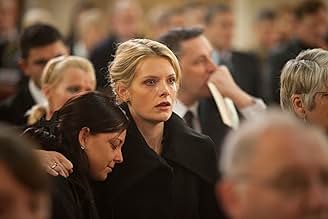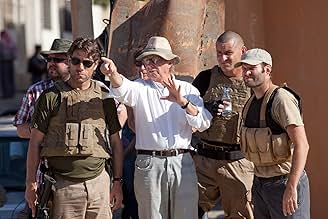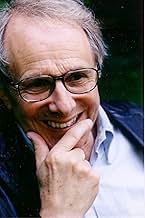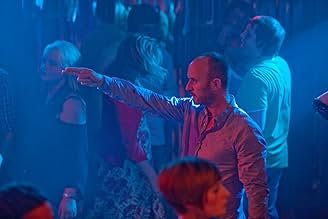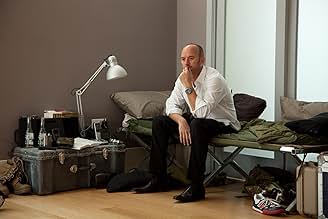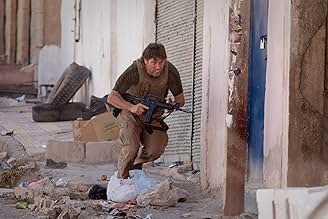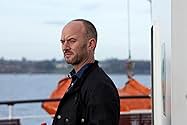VALUTAZIONE IMDb
6,4/10
4927
LA TUA VALUTAZIONE
Aggiungi una trama nella tua linguaThe story of a private security contractor in Iraq who rejected the official explanation of his friend's death and sets out to discover the truth.The story of a private security contractor in Iraq who rejected the official explanation of his friend's death and sets out to discover the truth.The story of a private security contractor in Iraq who rejected the official explanation of his friend's death and sets out to discover the truth.
- Regia
- Sceneggiatura
- Star
- Premi
- 2 candidature totali
Vortre Williams
- Nelson
- (as Trevor Williams)
Tony Schumacher
- Andy
- (as Anthony Schumacher)
Recensioni in evidenza
I almost don't want to be too honest about Ken Loach's latest. He is a national treasure after all. But then I remember what my job here is. 'Route Irish' is different from any other Loach film I've seen. Half the story is set in Iraq (Jordan), and uses techniques more typical of a Blockbuster.
Route Irish was, during the Iraq war, believed to be quite literally the most dangerous road in the world, where suicide bombings, Improvised Explosive Devices (IEDs) and other nasties were commonplace. Disbelieving that his best friend and army buddy, Frankie (comedian John Bishop) was KIA, Liverpudlian Fergus (Mark Womack) vows to get to the truth. Frankie, says Fergus, 'was born lucky'. If you can forgive this soupçon of implausibility from which the story emanates, you can enjoy (parts of) the film.
Twenty-four hour news makes us immune to the carnage of war. We tuck into our cornflakes while yawning at Apocalypse Now-style footage. Here, Ken Loach personalises war. He's always used film as a political medium to mirror his Left-leaning views. But there's a distinctly pluralistic advocacy on display in this film. Iraqis are at once sympathised with and blamed. The role of a soldier is both defended and upbraided. And the use of private contractors in the 'war on terror' is equally shielded and condemned.
The only bits that are worthy of Loach are the scenes of tension, for instance when Fergus explains to Rachel (Frankie's partner) that of course Frankie played around: 'Every day out there (Iraq) could be the last – how can you go from that to shopping at Tesco?'.
For such a kindly codger, Loach has quite a tolerance for profanity. The 'f' word doesn't bother me, but it's overdoing it a bit when you put the likes of Tarantino to shame. As the peerless critic Roger Ebert said of another film, 'profanity is used as punctuation'.
Strangely, a full-on waterboarding torture scene has no more terror than an exploding party popper. Clearly not destined to bother the Russian roulette scene from 'The Deer Hunter'. It's in tune with the general tone of the film: big ambitions, too little follow-through.
Various technical points distracted me from an otherwise half-decent melodrama. Fergus casually lets slip that he's ex-SAS. That would imply he's a man of considerable resourcefulness. So why can't he himself extract video clips from Frankie's primitive mobile phone to establish how he died? And why does he need to conduct online conference calls to amateurs for information? What's stopping him from Andy McNabbing his own way into Iraq?
www.scottishreview.net
Route Irish was, during the Iraq war, believed to be quite literally the most dangerous road in the world, where suicide bombings, Improvised Explosive Devices (IEDs) and other nasties were commonplace. Disbelieving that his best friend and army buddy, Frankie (comedian John Bishop) was KIA, Liverpudlian Fergus (Mark Womack) vows to get to the truth. Frankie, says Fergus, 'was born lucky'. If you can forgive this soupçon of implausibility from which the story emanates, you can enjoy (parts of) the film.
Twenty-four hour news makes us immune to the carnage of war. We tuck into our cornflakes while yawning at Apocalypse Now-style footage. Here, Ken Loach personalises war. He's always used film as a political medium to mirror his Left-leaning views. But there's a distinctly pluralistic advocacy on display in this film. Iraqis are at once sympathised with and blamed. The role of a soldier is both defended and upbraided. And the use of private contractors in the 'war on terror' is equally shielded and condemned.
The only bits that are worthy of Loach are the scenes of tension, for instance when Fergus explains to Rachel (Frankie's partner) that of course Frankie played around: 'Every day out there (Iraq) could be the last – how can you go from that to shopping at Tesco?'.
For such a kindly codger, Loach has quite a tolerance for profanity. The 'f' word doesn't bother me, but it's overdoing it a bit when you put the likes of Tarantino to shame. As the peerless critic Roger Ebert said of another film, 'profanity is used as punctuation'.
Strangely, a full-on waterboarding torture scene has no more terror than an exploding party popper. Clearly not destined to bother the Russian roulette scene from 'The Deer Hunter'. It's in tune with the general tone of the film: big ambitions, too little follow-through.
Various technical points distracted me from an otherwise half-decent melodrama. Fergus casually lets slip that he's ex-SAS. That would imply he's a man of considerable resourcefulness. So why can't he himself extract video clips from Frankie's primitive mobile phone to establish how he died? And why does he need to conduct online conference calls to amateurs for information? What's stopping him from Andy McNabbing his own way into Iraq?
www.scottishreview.net
Many movies are political but just a few directors are as consciously political film-maker like Ken Loach. This work hasn't got a clear left-wing agenda like others but it's his point on the Iraki war and handles subjects discussed upon many occasions, such as the exploitation of the unemployed and war crimes. Aside from the original (in Loach's films) issue, Route Irish is a characteristic production of this director and has many grim sequences. There are also very good acting performances that keep pace with the progress of the story. The conclusion is shocking but on the whole the film is a didactic and angry thriller, in the typical style of the social realist Loach.
A very strong piece of cinema by Ken Loach, away from his usual social dramas, being this more a kind of war-thriller, but not lacking strong denunciation and great courage. The director uses his camera to denounce the crude reality of contractors behind the real stage of Iraqui war. We get to know the life of these contractors, once simply called mercenaries, working for private security firms, whose acting inside wars seem uncontrollable and out of every rule. Loach wants to display and manages to display things in an objective and cold way, regaining the right perspective, showing that although in a war context it is difficult to take the right perspective, there is always, if we want to be honest, a well-cut border between good and evil, good people and bad people, between right and wrong, and this is the most convincing point through the movie. It's difficult to have a conscience with a gun or a bomb in your hands, but when innocent people are killed, and when your conscience prevails, one has to come to terms with it in some way, and the price to be paid may be very high. It's a very harsh movie, it has the crudity of a documentary piece, in search for as much as verity, that's why the more entertaining elements, such as the thriller one, and also the love between Fergus and Frank's wife is treated in a cold way, as if love cannot side with such atrocities. Certainly a thought-provoking, very actual movie which again raises many questions and doubts about the legitimacy of a "just war".
10rtaron
If you want a movie that will hold your attention and leave you feeling like you've watched a great movie, this is it. I am not a connoisseur of Ken Loach, or a movie snob, I just enjoy a movie that holds my attention.
Unlike the other reviewers, I thought the characters were well-drawn and convincing. The effects used on the film itself such as graininess, washed out lomo effect, and darkness in the right places, makes this a pleasure to watch.
The over-use of the f-bomb is a real factor. Men do talk exactly like that, but for a film less would have been more.
The politics of the mercenary world are shown brilliantly and without any sense of preachiness or one-sidedness.
Just an excellent movie.
Unlike the other reviewers, I thought the characters were well-drawn and convincing. The effects used on the film itself such as graininess, washed out lomo effect, and darkness in the right places, makes this a pleasure to watch.
The over-use of the f-bomb is a real factor. Men do talk exactly like that, but for a film less would have been more.
The politics of the mercenary world are shown brilliantly and without any sense of preachiness or one-sidedness.
Just an excellent movie.
Of course it evokes some social political problems, very real. And related to modern issues, topics: military private contractors, but the way to tell this story is surprising from a film maker as Ken Loach. It is not a Jason Bourne nor 007 movie, but is rather action oriented for me, and still surprising from a director as Loach. I also know that he has also made some more or less action films such as THE WIND THAT SHAKES THE BARLEY, but it spoke of the war in Ireland. Here it is nearly a movie where I would have imagined Jason Statham. Nearly. It then would have been an intellectual Jason Statham's vehicle, whilst it is here an action, badass Ken Loach.... But Ken Loach's fans won't be deceived. The torture sequence is just a joke, at least for the first part, in the final part, this is really gritty though. But at the beginning, I thought I could do it with my grandma, she would drink her tea in the same time. Putting the wet napkin on a face for only two seconds is just a joke. But for the end, we see just the torturer leaving the napkin and putting water on it without stopping.... This is realistic and gritty.
Lo sapevi?
- QuizActor Vortre Williams was really waterboarded for the film. Trying to fake it proved too clearly false so it was felt that it had to be performed for real. Despite hefty safety precautions, Williams was highly traumatized by the experience and suffered panic attacks for several weeks after.
- ConnessioniFeatured in At the Movies: Cannes Film Festival 2010 (2010)
I più visti
Accedi per valutare e creare un elenco di titoli salvati per ottenere consigli personalizzati
- How long is Route Irish?Powered by Alexa
Dettagli
- Data di uscita
- Paesi di origine
- Siti ufficiali
- Lingue
- Celebre anche come
- Route Irish
- Luoghi delle riprese
- Aziende produttrici
- Vedi altri crediti dell’azienda su IMDbPro
Botteghino
- Lordo in tutto il mondo
- 1.022.411 USD
- Tempo di esecuzione1 ora 49 minuti
- Colore
- Mix di suoni
- Proporzioni
- 1.85 : 1
Contribuisci a questa pagina
Suggerisci una modifica o aggiungi i contenuti mancanti

Divario superiore
By what name was L'altra verità (2010) officially released in Canada in English?
Rispondi

